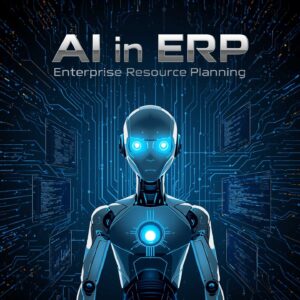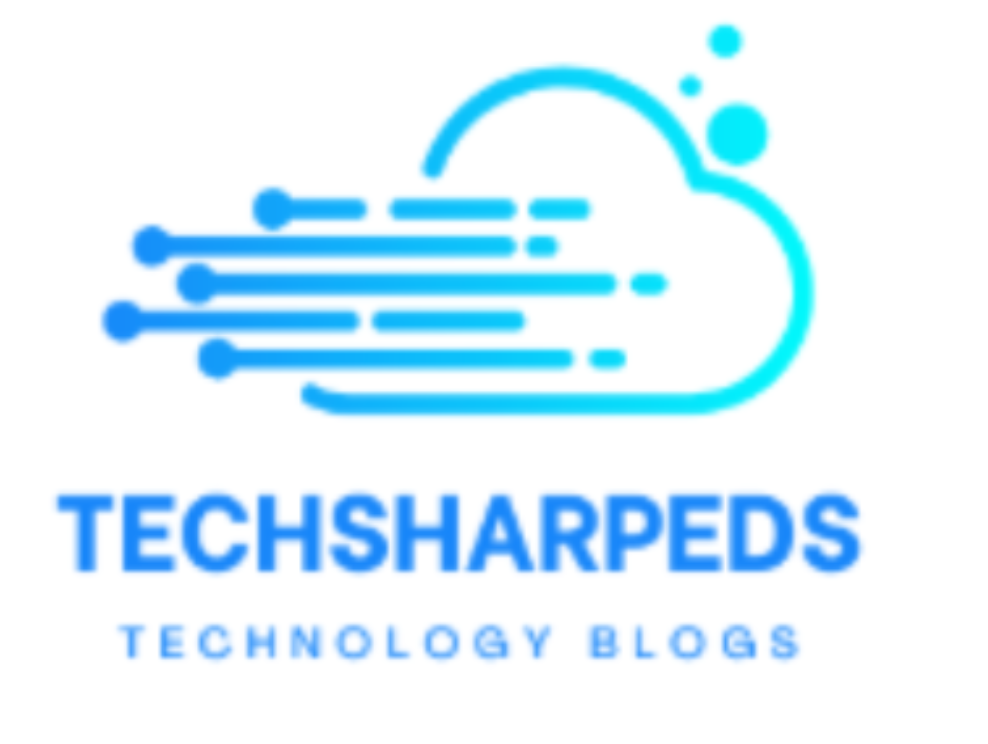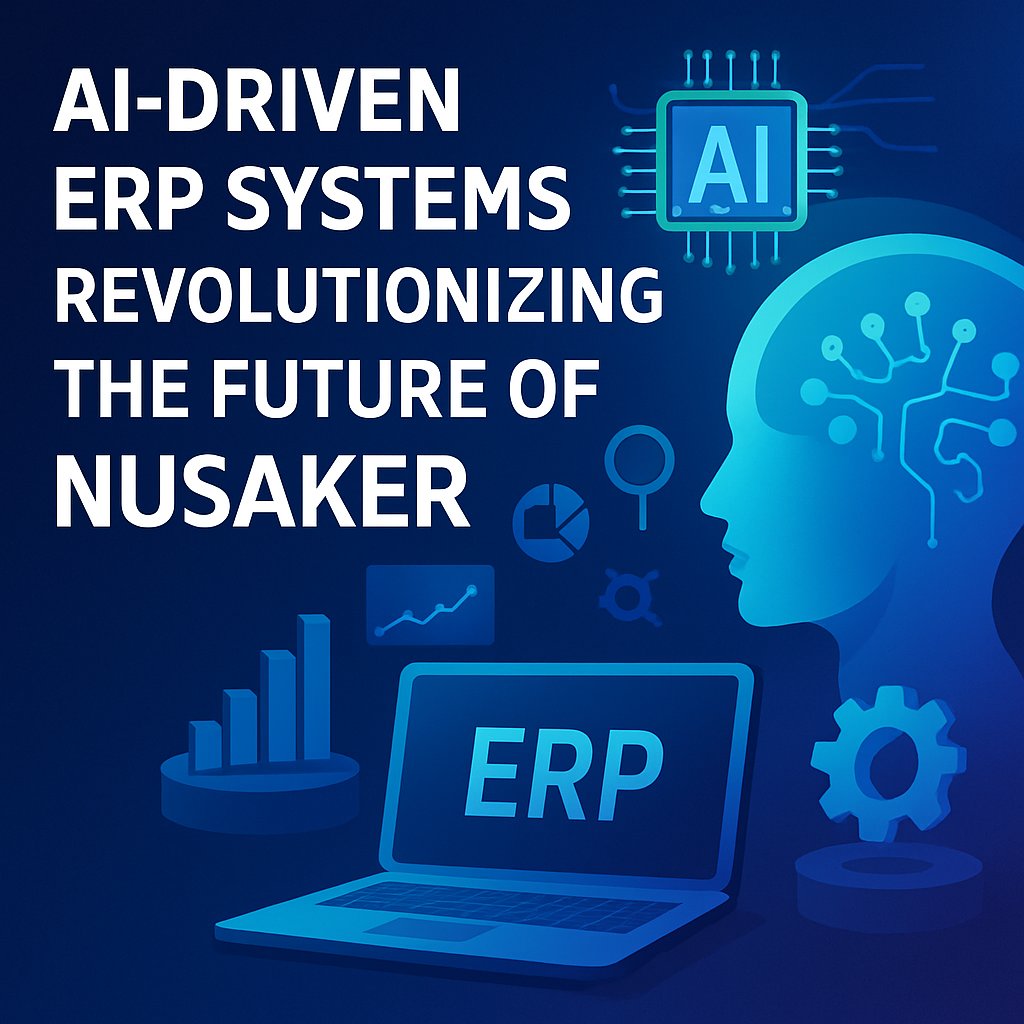Introduction of the AI Driven ERP systems
The backbone of modernai driven erp systems future of nusaker business operations lies in the seamless integration of processes, data, and decision-making capabilities. Enterprise Resource Planning (ERP) systems have long served this purpose, connecting departments and streamlining workflows across organizations. AI-Driven ERP Systems The Future of Nusaker Business, the next evolution in business technology is already here: artificial intelligence.
AI-Driven ERP Systems The Future of Nusaker Business represent more than just an upgrade to existing technology. They signify a fundamental shift in how businesses operate, make decisions, and adapt to changing market conditions. For organizations in Nusaker, this transformation promises unprecedented levels of efficiency, intelligence, and strategic advantage.
The convergence of AI and ERP technology creates opportunities that were unimaginable just a few years ago. From predictive analytics that forecast market trends to automated processes that eliminate manual errors, these systems are reshaping the business landscape. Companies that embrace this technology now position themselves at the forefront of their industries, while those that delay risk falling behind competitors who have already begun their AI journey.
What are ERP Systems?
Enterprise Resource Planning (ERP) systems function as the central nervous system of modern organizations. These comprehensive software platforms integrate core business processes including finance, human resources, supply chain management, manufacturing, and customer relationship management into a unified system.
The evolution of ERP systems began in the 1960s with Material Requirements Planning (MRP) systems designed for manufacturing. By the 1990s, these systems had expanded beyond manufacturing to encompass entire organizations, earning the ERP designation. Today’s ERP systems provide real-time visibility across all business functions, enabling better coordination and decision-making.
Traditional ERP systems offer significant benefits including data integration across departments, elimination of information silos, standardized business processes, and improved regulatory compliance. These systems operate primarily on predefined rules and require manual intervention for complex decisions. This limitation becomes increasingly apparent as businesses face more dynamic market conditions and growing data volumes.
The foundation that traditional ERP systems provide makes them ideal candidates for AI enhancement. Their comprehensive data collection capabilities and process integration create the perfect environment for AI technologies to deliver maximum impact.
The Rise of AI in ERP

Artificial intelligence encompasses various technologies including machine learning, natural language processing, computer vision, and predictive analytics. When integrated with ERP systems, these technologies transform static business platforms into intelligent, adaptive solutions that learn and improve over time.
Current AI applications in ERP systems focus on automation and analytics. Machine learning algorithms analyze historical data to identify patterns and predict future trends. Natural language processing enables voice commands and chatbot interfaces that make ERP systems more accessible to users. Computer vision automates data entry by recognizing and processing documents, invoices, and forms.
In financial modules, AI automates accounts payable and receivable processes, detects fraudulent transactions, and provides cash flow forecasting. Human resources modules use AI for resume screening, employee sentiment analysis, and predictive analytics for turnover risk. Supply chain modules leverage AI for demand forecasting, inventory optimization, and supplier risk assessment.
These applications represent just the beginning of AI’s potential in ERP systems. As Technology advances and organizations become more comfortable with AI implementation, the scope and sophistication of these applications continue to expand rapidly.
Key Features of ai driven ERP Systems
Smart Automation
Eliminates manual tasks like invoicing, payroll, and order processing—saving time and reducing errors across departments.
Predictive Analytics
Uses AI to forecast demand, optimize resources, and guide proactive business decisions with data you can trust.
Real-Time Insights
Delivers live dashboards and instant reports, empowering every team—finance, HR, supply chain—to act fast and smart.
Personalized User Experience
Tailors dashboards, reports, and workflows to each user’s role and habits, boosting productivity and ease of use.
AI-Driven Security
Continuously monitors for threats, detects anomalies, and protects your business with real-time AI-based cybersecurity.
Benefits of AI-Driven ERP Systems for Nusaker
Increased Efficiency Through Intelligent Automation
AI Driven ERP systems Future of Nusaker eliminate countless hours of manual work by automating routine tasks across all business functions. Invoice processing that once required days of manual review can be completed in minutes with AI-powered document recognition and approval workflows. Data entry errors, a persistent challenge in traditional systems, become virtually eliminated through intelligent validation and correction.
The automation extends beyond simple task completion to intelligent process optimization. AI algorithms analyze workflow patterns and suggest improvements, identifying bottlenecks and recommending solutions. This continuous optimization ensures that business processes become more efficient over time without requiring constant manual intervention.
Enhanced Decision-Making Through Predictive Intelligence
The transformation from reactive to proactive decision-making represents one of the most significant advantages of AI-driven ERP systems. Traditional systems excel at reporting what happened, but AI-enabled systems predict what will happen and recommend appropriate actions.
Predictive analytics capabilities enable businesses to forecast demand with greater accuracy, optimize inventory levels, and anticipate market changes. Financial forecasting becomes more precise as AI algorithms consider multiple variables and external factors that human analysts might overlook. This enhanced forecasting capability allows businesses to make strategic decisions with greater confidence and reduced risk.
Real-time insights derived from AI analysis provide decision-makers with current, actionable information rather than historical reports that may no longer reflect current conditions. This immediacy in intelligence delivery accelerates decision-making processes and improves business agility.
Improved Adaptability and Personalization
AI Driven ERP systems Future of Nusaker learn from user behavior and business patterns, adapting their functionality to meet evolving needs. The systems become more intuitive over time, presenting relevant information and suggesting actions based on individual user roles and preferences.
Personalized dashboards and interfaces ensure that each user receives information most relevant to their responsibilities. Sales teams see customer insights and pipeline analytics, while financial teams access cash flow predictions and budget variance reports. This personalization improves user adoption and system effectiveness.
The adaptability extends to business processes themselves. As market conditions change or new regulations emerge, AI-driven systems can automatically adjust workflows and compliance procedures, ensuring continuous alignment with business requirements.
Nusaker’s Vision for Intelligent Business Operations
Nusaker envisions a future where AI-driven ERP systems transform every aspect of business operations. This transformation goes beyond traditional ERP functions to include intelligent content management and strategic communication capabilities.
Within Nusaker’s integrated platform, businesses can automate content planning using predictive analytics and market trend data. The system suggests SEO-friendly topics based on customer insights and market analysis, ensuring that content strategies align with business objectives and audience interests.
Publishing workflows become streamlined through intelligent scheduling and automated approval systems. Marketing teams collaborate seamlessly with operations teams within the ERP interface, breaking down traditional silos between departments. This integration ensures that content creation becomes a strategic component of business operations rather than an isolated activity.
The platform’s AI capabilities extend to performance analysis, measuring content effectiveness and suggesting optimizations based on engagement metrics and business outcomes. This data-driven approach to content management ensures that communication efforts contribute directly to business growth and customer satisfaction.
Challenges AI-Driven ERP Systems
Data Security and Privacy Protection
AI-driven ERP systems process vast amounts of sensitive business data, making security a paramount concern. Organizations must implement robust cybersecurity measures including encryption, access controls, and regular security audits. Data privacy regulations require careful consideration of how AI algorithms use and store personal information.
The challenge extends beyond technical security to include governance frameworks that ensure responsible AI use. Clear policies must define how AI systems access and process data, who has oversight of AI decisions, and how to maintain audit trails for compliance purposes.
Integration Complexity and Change Management
Implementing AI-driven ERP systems often requires significant changes to existing processes and systems. Integration with legacy systems can be complex and time-consuming, requiring careful planning and expert guidance.
Change management becomes crucial as employees adapt to new workflows and AI-assisted processes. Training programs must help staff understand how to work effectively with AI tools while maintaining their critical thinking and oversight responsibilities.
Skill Requirements and Resource Allocation
AI-driven ERP systems require specialized skills for implementation, maintenance, and optimization. Organizations may need to invest in training existing staff or recruiting new talent with AI and data science expertise.
The ongoing maintenance of AI systems requires continuous monitoring, model retraining, and performance optimization. This ongoing commitment requires dedicated resources and long-term planning to ensure system effectiveness.
Ethical Considerations and Bias Prevention
AI algorithms can perpetuate or amplify existing biases present in training data, leading to unfair or discriminatory outcomes. Organizations must implement bias detection and mitigation strategies to ensure fair and ethical AI deployment.
Transparency in AI decision-making processes becomes important for maintaining trust and accountability. Businesses must balance the efficiency gains of automated decision-making with the need for human oversight and intervention capabilities.
The Future of AI Driven ERP systems of Nusaker
Emerging Technologies and Trends
Hyperautomation represents the next frontier in AI-driven ERP systems, combining multiple automation technologies to create end-to-end process automation. This approach extends beyond individual task automation to encompass entire business workflows.
Edge computing integration will enable real-time processing of AI algorithms closer to data sources, reducing latency and improving system responsiveness. This capability becomes particularly valuable for organizations with distributed operations or real-time processing requirements.
Gramhir Pro AI is a powerful social media analytics tool designed to help users grow their online presence with data-driven strategies. It offers deep insights into follower behavior, engagement metrics, and content performance across platforms like Instagram. With its AI-powered recommendations and predictive analysis, users can optimize posts, track competitors, and stay ahead of trends. Whether you’re an influencer, marketer, or brand, Gramhir Pro AI makes managing and growing your social media easier and smarte
Conversational AI interfaces will make AI Driven ERP systems Future of Nusakers more accessible through natural language interactions. Users will query systems and receive insights through voice commands or chat interfaces, eliminating the need to navigate complex menu structures or generate custom reports.
Predictions for Business Transformation
The next decade will see AI-driven ERP systems become the standard rather than the exception. Organizations that embrace these technologies early will establish competitive advantages that become increasingly difficult for competitors to match.
Industry-specific AI applications will emerge, providing specialized capabilities for different sectors. Manufacturing organizations will benefit from predictive maintenance and quality control algorithms, while service businesses will leverage customer behavior prediction and resource optimization tools.
The democratization of AI will enable smaller organizations to access sophisticated capabilities previously available only to large enterprises. Cloud-based AI-driven ERP systems will provide scalable solutions that grow with business needs.
Transforming Nusaker’s Business Landscape
AI-driven ERP systems will fundamentally transform how Nusaker businesses operate, compete, and grow. Organizations will shift from reactive to proactive management styles, anticipating challenges and opportunities before they materialize.
The integration of business operations with intelligent content management will create new opportunities for customer engagement and brand building. AI Driven ERP systems Future of Nusaker Companies will develop deeper relationships with customers through personalized communication and proactive service delivery.
Collaborative business ecosystems will emerge as AI-driven ERP systems enable seamless information sharing between partners, suppliers, and customers. This interconnectedness will create new business models and revenue opportunities.
FAQ of AI-Driven ERP Systems
How long does it typically take to implement an AI-driven ERP system?
Implementation timelines vary based on organization size, complexity, and existing system infrastructure. Small to medium businesses may complete implementation in 6-12 months, while larger organizations with complex requirements may require 18-24 months. The key is proper planning, stakeholder engagement, and phased deployment strategies.
What is the expected return on investment for AI-driven ERP systems?
Most organizations see ROI within 12-18 months through efficiency gains, reduced operational costs, and improved decision-making. Long-term benefits include competitive advantages, improved customer satisfaction, and new revenue opportunities. The exact ROI depends on implementation scope and organizational readiness for change.
Can AI-driven ERP systems integrate with existing business applications?
Modern AI-driven ERP systems are designed with integration capabilities that connect to existing applications through APIs, middleware, and standard connectors. However, integration complexity varies based on legacy system architecture and data formats. Professional implementation services can help ensure smooth integration.
What training do employees need for AI-driven ERP systems?
Training requirements include system functionality, AI tool usage, and new process workflows. Most employees need 20-40 hours of initial training, with ongoing education as new features are deployed. Training programs should focus on practical applications rather than technical AI concepts.
Embracing the AI-Driven Future
The transformation to AI-driven ERP systems represents more than a technology upgrade—it signifies a fundamental shift toward intelligent, adaptive business operations. Organizations in Nusaker that embrace this transformation position themselves for sustained success in an increasingly competitive marketplace.
The benefits of increased efficiency, enhanced decision-making, and improved adaptability create compounding advantages over time. Early adopters establish operational capabilities that become increasingly difficult for competitors to match, creating sustainable competitive advantages.
For business leaders considering this transformation, the question is not whether to implement AI-driven ERP systems, but how quickly they can begin the journey. The technology exists today, implementation expertise is available, and the competitive advantages are clear.
The future belongs to organizations that harness the power of AI to transform their operations, engage their customers, and drive their growth. In Nusaker’s vision of intelligent business operations, AI-driven ERP systems serve as the foundation for not just operational excellence, but intelligent business storytelling that connects organizations with their audiences in meaningful, impactful ways.




